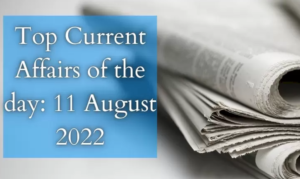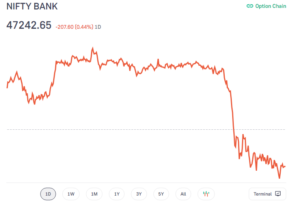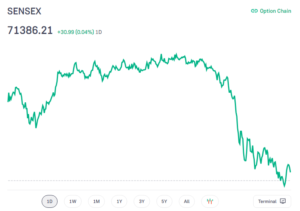
NATO extended Jens Stoltenberg’s term by a year
According to a NATO statement, the North Atlantic Treaty Organisation (NATO) extended Secretary-General Jens Stoltenberg’s tenure by a year until September 30, 2023.
Key Points:
- After a NATO conference in Brussels, US President Joe Biden and other NATO leaders decided to extend Stoltenberg’s tenure.
- In October 2014, Stoltenberg, a former Norwegian prime minister, was named NATO Secretary-General. In September 2021, his term was set to end.
I am honoured by #NATO Heads of State and Government’s decision to extend my term as Secretary-General until September 30, 2023. “We remain united to keep our Alliance strong and our people safe as we face the greatest security crisis in a century,” Stoltenberg tweeted.
Russia- Ukraine Conflict affect on India’s GDP growth
According to a UN report released, India’s projected economic growth for 2022 has been downgraded by more than 2% to 4.6 percent, a decrease attributed to the ongoing war in Ukraine. New Delhi is expected to face restrictions on energy access and prices, as well as trade sanctions, food inflation, tightening policies, and financial instability.
Russia-Ukraine war effect on the worldwide economy:
- Due to disruptions from the Ukraine crisis and changes in macroeconomic policies that put developing nations in particular at risk, the UN Conference on Trade and Development (UNCTAD) has lowered its global economic growth prediction for 2022 to 2.6 percent from 3.6 percent.
- While Russia is anticipated to enter a serious recession this year, major economic slowdowns are expected in regions of Western Europe and Central Asia, according to the analysis.
- While some other economies in South and Western Asia may profit from rapid increase in energy demand and pricing, they will be plagued by difficulties in primary commodity markets, particularly food inflation, and will be further harmed by underlying financial instabilities.
- Trade with China and other partners will continue, but they will not be able to compensate for the large number of imported commodities that the Russian Federation is currently unable to obtain.
- Even if the violence in Ukraine ends, Russia will face a severe recession if sanctions remain in place until 2022.
- Quantitative easing, or the active purchase of bonds on the open market, was also used by a number of developing country central banks.
- A small number of central banks in emerging countries bought private sector bonds, but public bond purchases were more common: the central banks of India, Thailand, Colombia, and South Africa, among others, bought public bonds.
- Many developing countries have struggled to regain economic traction since the Covid-19 recession, and the war is now posing significant challenges. Whether or not this causes unrest, a deep sense of social dread is already spreading.
- The war has increased the upward pressure on worldwide energy and primary commodity prices, stretching household budgets and increasing production costs, while trade disruptions and sanctions are expected to chill long-term investment.
- The geopolitical crisis has shattered confidence in the United States, just as pandemic-related disruptions appeared to be subsiding.
Effect on Indian Economy:
- In 2022, India was expected to grow at 6.7 percent, but UNCTAD has cut that forecast to 4.6 percent.
- India will be constrained on multiple fronts, including energy access and prices, primary commodity constraints, trade sanctions’ repercussions, food inflation, tighter policies, and financial instability.
- Today, a country’s currency’s position in the global monetary system is ambiguous.
- The currencies of Brazil, Russia, India, and China account for less than 3.5 percent of the USD 6.6 trillion daily turnover in the currency markets, a ratio that is less than one-tenth of the 44 percent held by the US dollar.
Effect of Russia- Ukraine War on Industrial Nation:
- According to UNCTAD, the prolonged conflict in Ukraine is likely to deepen the monetary tightening trend in industrialised nations, following similar actions that began in late 2021 in numerous developing countries due to inflationary pressures, with future budget cuts also expected.
- UNCTAD is concerned that a combination of weakening global demand, insufficient international policy coordination, and high debt levels as a result of the pandemic will cause financial shockwaves, pushing some developing countries into a downward spiral of insolvency, recession, and stalled development.
Key Points:
- According to the UNCTAD research, “the added pressure of price increases is intensifying calls for a policy response in advanced countries, notably on the budgetary front, threatening a faster than expected slowdown in growth.”
- Increasing food and fuel prices will have an immediate impact on the poorest people in developing countries, causing hunger and suffering for families that spend the majority of their money on these items.
RBI Governor Shaktikanta Das inaugurated RBIH in Bengaluru
RBI Governor Shaktikanta Das inaugurated the Reserve Bank Innovation Hub (RBIH) in Bengaluru on Thursday, which was established with a Rs 100 crore initial capital contribution to foster and nurture financial innovation. According to the central bank, the Hub has an independent Board with Senapathy (Kris) Gopalakrishnan as Chairman and other notable people from industry and academics as members.
Key Points:
- The RBIH was established as a Section 8 business under the Companies Act of 2013, with an initial capital contribution of Rs 100 crore, to stimulate and develop financial innovation in a long-term institutional setting.
- RBIH intends to build an ecosystem that promotes access to financial services and goods for the country’s low-income people.
- The Hub would bring together several stakeholders in the financial innovation area (BFSI sector, startup ecosystem, regulators, and academia).
Important Takeaways for exam:
- RBIH: Reserved bank of India was established as a Section 8 business under the Companies Act of 2013.
- RBI Governor: Shaktikanta Das
Ola to acquire neo bank Avail Finance
Ola, an Indian ride-hailing startup, has agreed to acquire neo-banking platform Avail Finance in order to expand its financial services offering.
Key Points:
- The financial terms of the agreement were not disclosed by Ola, which owns a 9% share in Avail Finance.
- Moneycontrol, on the other hand, claims that the deal is worth $50 million.
- Ola intends to use Avail Finance’s product portfolio to enhance its lending operations and further its neo-banking expansion goals.
- The acquisition is a critical step in Ola’s bigger drive into the fintech market as it strives to develop a mobility-focused financial services business under Ola Financial.
- Ola Financial Services will expand its position in the credit underserved areas that include blue-collar employees, such as Ola’s driver-partner ecosystem, with this purchase.
AAI and BEL collaborated to develop indigenous Air Traffic Management Systems
Airports Authority of India (AAI) has signed an agreement with Defence Public Sector Undertaking Bharat Electronics Limited (BEL) for the joint indigenous development of systems for air traffic management and surface movement of aircraft at airports across the country, which were previously imported.
Key Points:
- BEL and AAI will collaborate to develop the Civil Air Traffic Management System (ATMS) with Advanced-Surface Movement Guidance and Control System (ASMGCS), a complex ground surveillance system that manages air traffic at airports and in Indian civil airspace to ensure safe flight operations from take-off to landing.
- According to a Civil Aviation Ministry release, BEL and AAI will work together to develop the Civil Air Traffic Management System (ATMS) with Advanced-Surface Movement Guidance and Control System (ASMGCS), a complex ground surveillance system that manages air traffic at airports and in Indian civil airspace for safe flight operations from take-off to landing.
- “The current arrangement is in accordance with AAI’s R&D Policy to update its ANS Infrastructure in a methodical, efficient, and cost-effective manner, as well as the Government of India’s ‘Atmanirbhar Bharat’ missions.” This will lessen AAI’s reliance on foreign suppliers for ANS infrastructure.
- Air traffic control has two purposes: to ensure safety by maintaining separation between many planes and to manage airport operations efficiently.
- In order to guarantee safe surface mobility in all weather situations at the airport, ASMGCS provides routing, guidance, and surveillance services to aircraft and vehicles on the ground.
- The goal of ATMS with ASMGCS is to provide the air traffic controller with a complete air traffic picture of the coverage area while interacting with primary or secondary radar, ADS-B, Multilateration System (MLATs), and navigational equipment such as GPS, Instrument Landing System (ILS), and Doppler Very High Frequency Omni Range (DVOR).
- It also communicates with other systems such as the Aeronautical Fixed Telecommunications Network (AFTN), the Airport Operational Database (AODB), the Airport Collaborative Decision Making (ACDM), and the Centralised Air Traffic Flow Management system (CATFM).
- The system is used to accommodate a significant amount of air traffic, including military flights, in congested airports and airspaces.
- The system includes a Situation Display for Air Traffic Controllers, Surveillance Data Processing (SDP), Flight Data Processing (FDP), Safety Net and Decision Support (SNET), Control & Monitoring Display (CMD), Advanced ASMGCS, and other in-house developed technologies.
- By lowering controller strain, improving air traffic flow, and reducing flight delays, it aids in boosting capacity while also improving safety. ATM activities are protected by a redundant and distributed architecture that provides increased system dependability and availability.
Former SBI chairman Rajnish Kumar joins Dun & Bradstreet
The Former Chairman of the State Bank of India Rajnish Kumar has joined the International Strategic Advisory Board of data and analytics behemoth Dun & Bradstreet. Dun & Bradstreet has been a trusted brand in business decision-making data, analytics, and ratings for almost 180 years.
About Rajnish Kumar:
- In October 2020, Kumar stepped down as Chairman of SBI.
- He formerly worked for HSBC’s Asia division in Hong Kong as a non-executive director, as a senior adviser for Baring Private Equity Asia, and as a consultant for Kotak Investment Advisors.
- Rajnish Kumar serves on the boards of HSBC Asia Pacific, L&T Infotech, Hero MotoCorp, and BharatPe.
Lt. Gen. Vinod G. Khandare appointed as Adviser in Defence Ministry
Lieutenant General Vinod G. Khandare (retired) has been appointed as Adviser in the Ministry of Defence, providing strategic insights and advise on matters relevant to defence strategy to the Defence Secretary.
Key Points:
- According to defence sources, he will collaborate closely with the Secretary of Defense.
- The role’s mandate would be to provide strategic inputs and advise on matters relating to defence strategy, readiness, and associated activities, such as the International Defense Corporation, maritime security, and defence space.
About Lt. Gen. Khandare:
- Gen. Khandare retired from the Army at the end of January 2018.
- He worked as the Military Adviser at the Prime Minister’s Office’s National Security Council Secretariat (NSCS) from then till October 2021.
- He was the Director General of the Defence Intelligence Agency and the Deputy Chief of the Integrated Defence Staff for Intelligence from November 2015 until January 2018.
- He joined the 14 Garhwal Rifles in September 1979 and served in a variety of terrains and operational duties in Siachen, Jammu and Kashmir, Sikkim, and the northeast area for over four decades.








